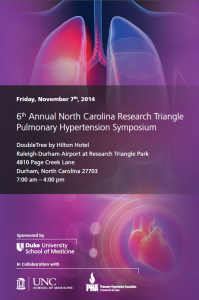6th Annual NC Research Triangle Pulmonary Hypertension Symposium to be Held on November 7 in Durham
Written by |

 The 6th Annual North Carolina Research Triangle Pulmonary Hypertension Symposium will be held on November 7th at the DoubleTree by Hilton Hotel Raleigh-Durham Airport in Research Triangle Park, from 7am to 4pm.
The 6th Annual North Carolina Research Triangle Pulmonary Hypertension Symposium will be held on November 7th at the DoubleTree by Hilton Hotel Raleigh-Durham Airport in Research Triangle Park, from 7am to 4pm.
The event is endorsed by the American Thoracic Society, sponsored by the Duke University School of Medicine (accredited by the Accreditation Council for Continuing Medical Education) and is the result of a joint effort of the University of North Carolina and the Pulmonary Hypertension Association to inform pulmonologists, cardiologists, nurses and any healthcare professionals about new research and treatments regarding pulmonary hypertension (PH). Special events dedicated to PH patients and caregivers will be held as well, and registration is free for them.
[adrotate group=”4″]
As noted in the event’s official brochure, the initiative was planned in response to the fact that “the field of pulmonary arterial hypertension (PAH) is changing rapidly with multiple new and recently approved pharmacologic therapies.” Primary care physicians (PCPs) are being challenged to include PAH in differential diagnoses to facilitate early detection of the disease and to referral patients to specialty centers sooner, while pulmonologists and cardiologists are being encouraged to constantly update their knowledge base and experience in treating the disease. “This dynamic state of pulmonary hypertension (PH), including new research and treatments, means there are constant and new gaps in provider knowledge of appropriate diagnostic procedures, available treatment choices, and pitfalls and challenges in the diagnosis and treatment of the disease.”
[adrotate group=”3″]
In the end, participants will have improved capabilities to describe PH types and be aware of mixed cases of PH (as combined pre- and post-capillary PH); better recognize and react to various forms of WHO Group 5 (with unclear multifactorial mechanisms); identify treatment options and how to apply recent approved PAH pharmacologic therapies; and identify cases in which treatment is suboptimal and that should be transferred to specialty centers and employ appropriate non-pharmacologic interventions.
For further information about the event, faculty directors and invited faculty, registration, accommodation and cancellation policy, visit the event’s official page or contact Wendy Sprintz through email ([email protected]).



